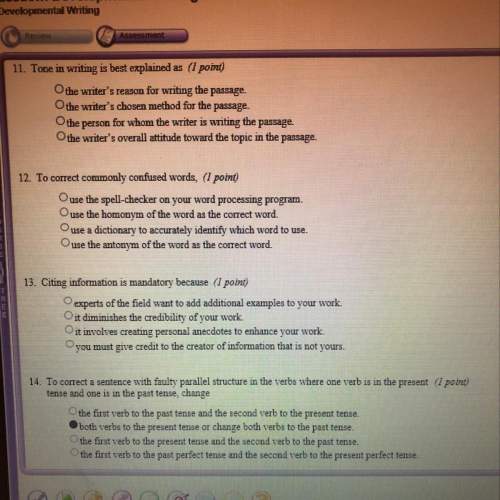Paris: happily met, my lady and my wife!
juliet: that may be, sir, when i may be a wi...

English, 31.01.2020 18:01 whitakers87
Paris: happily met, my lady and my wife!
juliet: that may be, sir, when i may be a wife.
paris: that may be must be, love, on thursday next.
juliet: what must be shall be.
friar laurence: that's a certain text.
paris: come you to make confession to this father?
juliet: to answer that, i should confess to you.
paris: do not deny to him that you love me.
juliet: i will confess to you that i love him.
paris: so will ye, i am sure, that you love me.
juliet: if i do so, it will be of more price,
being spoke behind your back, than to your face.
paris: poor soul, thy face is much abused with tears.
juliet: the tears have got small victory by that;
for it was bad enough before their spite.
paris: thou wrong'st it, more than tears, with that report.
juliet: that is no slander, sir, which is a truth;
and what i spake, i spake it to my face.
paris: thy face is mine, and thou hast slander'd it.
juliet: it may be so, for it is not mine own.
are you at leisure, holy father, now;
or shall i come to you at evening mass?
friar laurence: my leisure serves me, pensive daughter, now.
my lord, we must entreat the time alone
in this passage from act iv of romeo and juliet, juliet goes to friar laurence for advice because her father is forcing her to marry count paris. when she gets to the friar’s room, paris is there, arranging for the wedding. which literary technique is used in this exchange between paris and juliet?
a. dramatic irony
b. foreshadowing
c. imagery
d. flashback

Answers: 1


Other questions on the subject: English

English, 22.06.2019 01:50, jurnee77
Plagiarism quiz read both the paragraph below and the information following it that identifies the source using the american psychological association format. then read each of the numbered statements and determine if each is plagiarized or not. circle “yes” if the statement is plagiarized, “no” if it is not, and then fix the “yes” answers). original source the presence of the taiwanese on everest was a matter of grave concern to most of the other expeditions on the mountain. there was a very real fear that the taiwanese would suffer a calamity that would compel other expeditions to come to their aid, risking further lives, to say nothing of jeopardizing the opportunity for other climbers to reach the summit. but the taiwanese were by no means the only group that seemed egregiously unqualified. camped beside us at base camp was a twenty-five-year-old norwegian climber named peter neby, who announced his intention to make a solo ascent of the southwest face, one of the peak’s most dangerous and technically demanding routes—despite the fact that his himalayan experience was limited to two ascents of neighboring island peak, a 20,274-foot bump that required little more than vigorous walking. krakauer, j. (1998). into thin air: a personal account of the mount everest disaster. new york: anchor books, 122 - 3. student samples yes 1. there was a very real fear that the taiwanese would suffer a calamity that would compel other expeditions to come to their aid(krakauer, 1998). no) 2. many climbers overestimate their abilities, as krakauer (1998) explains when he writes of peter neby, whose himalayan experience in the past “required little more than vigorous walking” (122 - 3). no 3. jon krakauer (1998) discusses other concerns besides those of unpredictable weather and his own climbing group’s capabilities. for example the existence of a taiwanese group on everest was a matter of serious unease to most everyone else on the mountain. yes/no 4. krakauer (1998) states that the taiwanese group was not the only inexpert climbers to attempt mt. everest: camped beside us at base camp was a twenty-five-year-old norwegian climber named peter neby. . [whose] himalayan experience was limited to two ascents of neighboring island peak, a 20,274-foot bump that required little more than vigorous walking (122 – 3). yes/no 5. the author asserts that the taiwanese “were by no means the only group that seemed egregiously unqualified.” yes/no 6. in his book into thin air, jon krakauer (1998) discusses many of the dangers he noted prior to his disastrous attempt to climb mt. everest in 1996. among them were encounters with other groups and individual climbers who were ill-trained and ill-equipped to handle the demands of such a climb.
Answers: 2

English, 22.06.2019 03:00, hdjsjfjruejchhehd
In poem daffodils-how do we know that the yellow daffodils has a long lasting effect on the speaker.
Answers: 2

English, 22.06.2019 06:40, ashleyfay6350
When a progressive tense is used in the independent clause, the dependent clause typically uses the tense.
Answers: 2

English, 22.06.2019 07:30, cmflores3245
After the doctors question their authenticity, the duke suggest that he and the king leave immediately with the money they have already stolen. why does the king refuse to leave
Answers: 1
You know the right answer?
Questions in other subjects:

Mathematics, 24.10.2020 21:30


English, 24.10.2020 21:30


Mathematics, 24.10.2020 21:30

English, 24.10.2020 21:30



Chemistry, 24.10.2020 21:40




